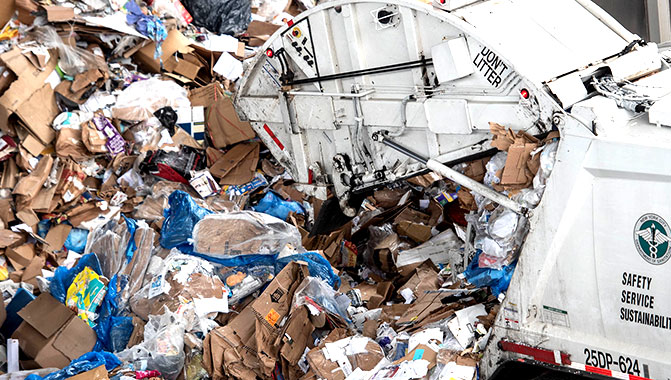Photo Courtesy of Michael Appleton/Mayoral Photography Office
Across the five boroughs, approximately 36 million pounds of single-use plastic foodware is collected from NYC’s residential waste stream. Tens of millions more pounds are collected from commercial establishments.
By Forum Staff
Mayor Bill de Blasio on Thursday signed an executive order that will end the direct City purchase of unnecessary single-use plastics in favor of compostable or recyclable alternatives.
According to the administration, City agencies purchase at least 1.1 million pounds of single-use plastic foodware every year, which includes plastic straws, cutlery, plates, bowls, cups, and trays. Thursday’s executive order will reduce the City’s carbon emissions by approximately 500 tons per year, decrease plastic pollution, and reduce risks to wildlife, de Blasio said.
The City estimates this EO will reduce the purchase of single-use plastics by City agencies by 95 percent, and will begin implementation by the end of the year.
According to the administration, as a result of the executive order, no new contracts will be signed for single-use plastic foodware other than to maintain a sufficient supply of certain items to be provided upon request. All relevant agencies are directed to begin reducing their use of single-use plastic immediately, Hizzoner said, and must also prepare a reduction plan within 120 days. Full implementation of the reduction plans is targeted for the end of the year.
“Big Oil has been pushing single use plastics for too long—and it stops here,” de Blasio said at the Sims Municipal Recycling Material Recovery Facility in Sunset Park, Brooklyn.
However, de Blasio pointed out that the City recognizes that certain single-use plastic items including plastic straws are a continued necessity for some people—including New Yorkers with disabilities—that cannot use currently available alternative products and affirms the ability of all individuals to receive single-use plastic items without question or cost upon request. Under the executive order, a sufficient supply of single-use plastic foodware will continue to be made available for anyone who requests such items and maintained for other purposes including emergency preparedness and medical uses.
De Blasio also announced on Thursday that he supports pending City Council legislation to reduce the single-use plastic foodware in private establishments, and will work with the council to ensure the legislation includes appropriate accommodations for individuals who cannot use non-plastic alternatives in a similar manner to the executive order.
According to the Mayor’s Office, single-use plastic products, which are designed to be used once and then thrown away, are “a pervasive threat” to neighborhoods, waterways, and climate. Across the five boroughs, approximately 36 million pounds of single-use plastic foodware is collected from NYC’s residential waste stream. Tens of millions more pounds are collected from commercial establishments. Discarded plastics also get discarded as litter and washed into waterways, impacting water quality and harming plant and animal life in New York City’s ecosystems, the administration noted. Reducing single-use plastic use, while simultaneously maintaining a sufficient supply of certain single-use plastic items since some people cannot use alternative products, will lessen the City’s reliance on petroleum-based products in a way that takes the needs of all New Yorkers into account.
“Let’s call single-use plastic what it is: pollution,” said Mark Chambers, director of the Mayor’s Office of Sustainability. “We need to leave theses harmful plastics behind, and reducing the City’s use of plastic foodware is a huge step in that direction.”

